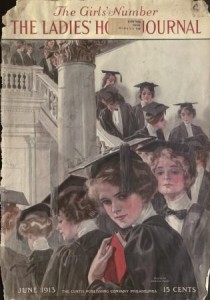 CALL FOR PROPOSALS
CALL FOR PROPOSALS
Education Harlem: Histories of Learning and Schooling in an American
Community
Scholarly Conference Series
Teachers College
Columbia University
Sponsored by the Teachers College Program in History and Education,
Institute for Urban and Minority Education, and Center on History and
Education
Fall 2013 and Fall 2014
We seek to establish a scholarly community focused on investigating the history of education, broadly defined, in 20th century Harlem. We invite proposals for papers to be presented at two conferences at Teachers College, for which travel expenses will be paid. The first conference, October 10-11, 2013, will offer authors an opportunity to present works-in-progress for discussion with fellow contributors and selected senior scholars participating as discussants. Revised and completed papers will be presented at a larger public conference in October 2014. Most or all of the finalized papers will be published as an edited volume or journal special issue. We welcome submissions from graduate students as well as junior and senior scholars, and from historians as well as those undertaking historical analysis in other social science and humanities fields.
*Conference Focus*
All of the forces that shaped education in the 20th century U.S. ran
through Harlem, often in amplified form because of the particular
confluence of people, ideas, and institutions in this community.
Nonetheless, Harlem remains understudied in the history of education.
By investigating the historical forms and meanings of education – in
schools and beyond – in Harlem, we hope to support and provoke a rich
vision of the place of education in communities and the reciprocal
relationships between communities and schools. We will help explain why and
how education has taken the forms that it has, by considering the roles of
communities, students, teachers, policy makers, local and national leaders,
and political and economic trends in shaping learning and schooling in
local context.
Contributions may include studies sited in Harlem that explore, but are not
limited to:
· Community and youth advocacy for education broadly defined
· The city as educator: formal and informal education in non-school
settings
· Contested notions of educational equality
· Curricular innovation and experimentation
· College and university interaction with urban schools and districts
· Education within social movements and organizing traditions
· Teacher organizing and professionalism
· School governance and leadership
· Advocacy for, and the influence of, higher education
· The urban built environment as it relates to schooling and learning
· Schools and the production of racial, ethnic, linguistic, and gender
identity
· Cultural and artistic production and education
· Schooling and the carceral state
We are particularly interested in studies sited in Harlem that:
· Link historical narratives of urban history (in housing, employment,
health, and other aspects of urban life) with narratives of learning and
schooling
· Integrate knowledge of local activism and organizing with attention
to the policy choices and structural forces against which local activists
and organizers struggled
· Examine historical developments in politics and economics that help
contextualize and explain contemporary school reform efforts
· Introduce new ways of researching stories of learning and schooling
*Opportunities in Digital History*
Contributors to the conference also will have the opportunity to explore
how their research could relate to a digital archive on the history of
education in Harlem, now under development at Teachers College. Inspired in
part by the model of University of Sydney’s *Digital Harlem*
http://acl.arts.usyd.edu.au/harlem/ ,
the digital archive will use a spatial interface to present both existing
archival material and new contributions. Scholars who have ideas for how
their research might contribute to or benefit from such a digital resource
are welcome to describe these ideas in an addendum to their submission.
*Submission guidelines:*
Please describe your proposed contribution in an abstract of no more than
1,000 words, including the paper’s sources, historiographical context, and
key contributions. Please also include a one- to two-page C.V. Submissions
will be accepted electronically, via an online submission system accessed
via http://www.tc.edu/a&h/history-ed/ until February 1, 2013.
If you need additional information or have questions, please contact Ansley
Erickson, erickson@tc.columbia.edu
The Educating Harlem project is made possible by support from the Teachers
College Provost’s Investment Fund, Thomas James, Provost and Dean of the
College.
Ansley T. Erickson, Assistant Professor, History and Education, Teachers
College, Columbia University
Ernest Morrell, Director, Institute for Urban and Minority Education and
Professor, Teachers College, Columbia University
Cally Waite, Associate Professor, History and Education, Teachers College,
Columbia University
—
Ansley T. Erickson
Assistant Professor, History and Education
Teachers College, Columbia University
www.tc.edu/faculty/ate11
![]() This conference, which will be held at the Heyman Center at Columbia University on Feb. 8-9, 2013, examines the flourishing of women’s history in Britain in the 1970s, and the changing place of women’s and gender history within the academy. What have successive generations taken from earlier generations’ work, and how have they transformed it? What happened to those early theories and networks? What has been gained and lost through the process of institutionalization? What has happened both to the ‘place’ of the feminist imperative within history, and to the relatively privileged place of Britain within that scholarship?
This conference, which will be held at the Heyman Center at Columbia University on Feb. 8-9, 2013, examines the flourishing of women’s history in Britain in the 1970s, and the changing place of women’s and gender history within the academy. What have successive generations taken from earlier generations’ work, and how have they transformed it? What happened to those early theories and networks? What has been gained and lost through the process of institutionalization? What has happened both to the ‘place’ of the feminist imperative within history, and to the relatively privileged place of Britain within that scholarship?


